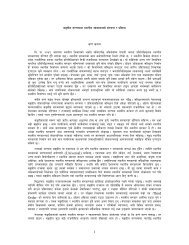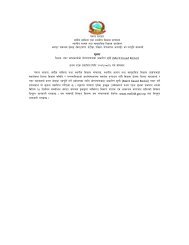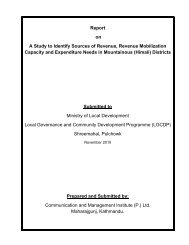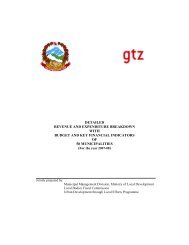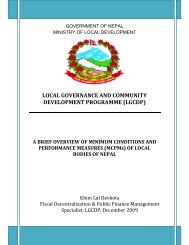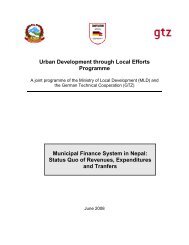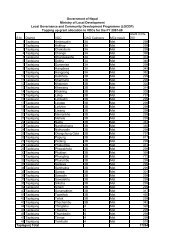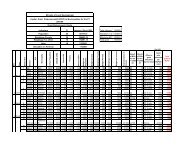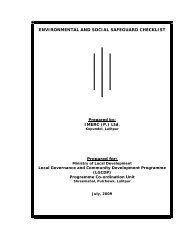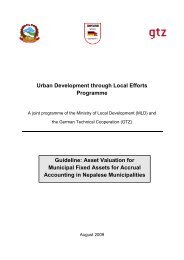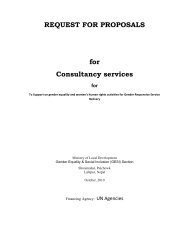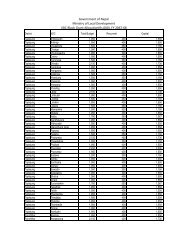GTZ Report on Accrual Accounting Status Quo - LGCDP
GTZ Report on Accrual Accounting Status Quo - LGCDP
GTZ Report on Accrual Accounting Status Quo - LGCDP
You also want an ePaper? Increase the reach of your titles
YUMPU automatically turns print PDFs into web optimized ePapers that Google loves.
Cash <strong>Accounting</strong> vs. <strong>Accrual</strong> <strong>Accounting</strong> 6<br />
Disadvantages of <strong>Accrual</strong> <strong>Accounting</strong><br />
Most of the criticism related to accrual accounting arises from the relative complexity of the system, compared to<br />
cash accounting as well as high implementati<strong>on</strong> costs (e.g. regarding the valuati<strong>on</strong> of assets, training and<br />
informati<strong>on</strong> technology) (Athukorala & Reid, 2003, p.24). As a result of that, the implementati<strong>on</strong> of accrual accounting<br />
is challenging especially for smaller municipalities. Without external support most of those municipalities are not able to<br />
adopt accrual accounting caused by a limited number of human resources and adequately trained pers<strong>on</strong>nel as well as<br />
low financial capabilities.<br />
In additi<strong>on</strong> criticism arises about the so called vague estimati<strong>on</strong>s about the values of the assets of a municipality, which<br />
are used for depreciati<strong>on</strong>s and maintenance later <strong>on</strong>. However, wr<strong>on</strong>g valuati<strong>on</strong> will be recognized in accrual<br />
accounting after some time, since an engineer will see if depreciati<strong>on</strong> and c<strong>on</strong>nected reserve allocati<strong>on</strong> for<br />
maintenance and reinvestment are picturing the reality.<br />
Moreover the operati<strong>on</strong> of such a system is supposed to be more difficult, skill-intensive and expensive since it<br />
requires additi<strong>on</strong>al educati<strong>on</strong> of human resources (HR) and, at some stage, the use of Informati<strong>on</strong> Technology (IT)<br />
(Boothe, 2007, p.196; Athukorala & Reid, 2003, p.25; Wynne, 2003; Wynne, 2004, p.9-11). This certainly is correct but<br />
<strong>on</strong>e has also to take into account the l<strong>on</strong>g term benefits accrual accounting can provide in revenue mobilizati<strong>on</strong><br />
through tax management, asset management and debt management for instance. However, in some cases the<br />
acknowledgement of receivables creates big expectati<strong>on</strong>s regarding the upcoming revenues, which are being rarely<br />
achieved by the local governments in the short term. Some of the criticism holds especially true for developing<br />
countries (IMF, 2007, p.17). Not <strong>on</strong>ly because of the menti<strong>on</strong>ed difficulties which all countries experience, but also<br />
because of problems like corrupti<strong>on</strong>, unclear property rights, capacity and resource c<strong>on</strong>straints, informal ec<strong>on</strong>omies,<br />
informality etc. (Schick, 2006). These problems however will affect both cash accounting but also accrual accounting.<br />
Still, the menti<strong>on</strong>ed problems and difficulties are the reas<strong>on</strong> why accrual accounting implementati<strong>on</strong> in developing<br />
countries requires a carefully planned, comprehensive and l<strong>on</strong>g term approach, including the necessary technical,<br />
financial and political support and commitment by the relevant stakeholders. This is needed to overcome obstacles like<br />
capacity c<strong>on</strong>straints, corrupti<strong>on</strong>, manipulati<strong>on</strong>, lack of resources, the lack of formal accounting regulati<strong>on</strong>s, policies,<br />
fiscal rules, standards and manuals etc. (Athukorala & Reid, 2003, p.53-61; Boothe, 2007, p.195-199).<br />
All in all just a few minor steps, starting with the booking of cash transacti<strong>on</strong>s based <strong>on</strong> an accrual accounting system<br />
(this would include taxes, fees etc.), can improve the financial management of resource c<strong>on</strong>straint local governments in<br />
Nepal.



